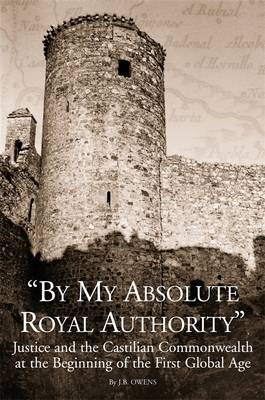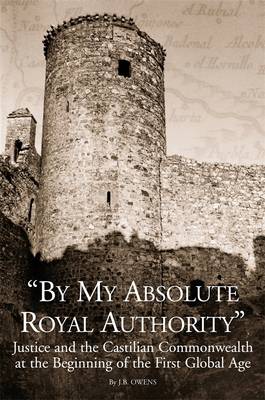
- Afhalen na 1 uur in een winkel met voorraad
- Gratis thuislevering in België vanaf € 30
- Ruim aanbod met 7 miljoen producten
- Afhalen na 1 uur in een winkel met voorraad
- Gratis thuislevering in België vanaf € 30
- Ruim aanbod met 7 miljoen producten
Zoeken
By My Absolute Royal Authority
Justice and the Castilian Commonwealth at the Beginning of the First Global Age
J B Owens
€ 136,95
+ 273 punten
Omschrijving
A study of the kingdom of Castile's judicial administration that brings together political ideas and political action by giving serious attention to how well royal justices were able to handle difficult, prominent lawsuits that raised politically troubling questions and involved major litigants. "By My Absolute Royal Authority" Justice and the Castilian Commonwealth at the Beginning of the First Global Age is a study of judicial administration. From the fifteenth century to the seventeenth, the kingdom of Castileexperienced a remarkable proliferation of judicial institutions, which historians have generally seen as part of a metanarrative of "state-building." Yet, Castile's frontiers were extremely porous, and a crown government that could not control the kingdom's borders exhibited neither the ability to obtain information and shape affairs, nor the centrality of court politics that many historians claim in an effort to craft a tidy narrative of this period.
Castilians retained their loyalty to the monarchy not because of the "power" of the institutions of a developing "state," but because they shared an identity as citizens of a commonwealth in which a high value was given to justice as an ultimate purpose of the political community and a conviction that the sovereign possessed "absolute royal authority" to see that justice was done. This expectation served as a foundation for the political identity and loyalty that held together for several centuries the disparate and globally-dispersed domains of the Hispanic Monarchy, but perceptions of how well crown judicial institutions worked were a fundamental determinant of the degree of support a monarch could attract to meet fiscal and military goals.
This book maps part of this unfamiliar terrain through a microhistory of an extended, high profile lawsuit that was carefully watched by generations of Castilian leaders. Justices from the late fifteenth century to the reign of Philip II had difficulty resolving the conflict because the proper exercise of "absolute royal authority" was itself the central legal issue and the dispute pitted against each other members of important groups who demonstrated a tendency to give prominence to different interpretive schemes as they tried to comprehend their world. The account brings together political ideas and political action by giving serious attention to how well royal justices were able to handle difficult, prominent lawsuits that raised politically troubling questions and involved major litigants. J. B. Owens is Professor of the History and Director of the Glenn E. Tyler Collection at Idaho State University, where he specializes in Spanish history and the use of Geographic Information Systems for research and teaching.
Castilians retained their loyalty to the monarchy not because of the "power" of the institutions of a developing "state," but because they shared an identity as citizens of a commonwealth in which a high value was given to justice as an ultimate purpose of the political community and a conviction that the sovereign possessed "absolute royal authority" to see that justice was done. This expectation served as a foundation for the political identity and loyalty that held together for several centuries the disparate and globally-dispersed domains of the Hispanic Monarchy, but perceptions of how well crown judicial institutions worked were a fundamental determinant of the degree of support a monarch could attract to meet fiscal and military goals.
This book maps part of this unfamiliar terrain through a microhistory of an extended, high profile lawsuit that was carefully watched by generations of Castilian leaders. Justices from the late fifteenth century to the reign of Philip II had difficulty resolving the conflict because the proper exercise of "absolute royal authority" was itself the central legal issue and the dispute pitted against each other members of important groups who demonstrated a tendency to give prominence to different interpretive schemes as they tried to comprehend their world. The account brings together political ideas and political action by giving serious attention to how well royal justices were able to handle difficult, prominent lawsuits that raised politically troubling questions and involved major litigants. J. B. Owens is Professor of the History and Director of the Glenn E. Tyler Collection at Idaho State University, where he specializes in Spanish history and the use of Geographic Information Systems for research and teaching.
Specificaties
Betrokkenen
- Auteur(s):
- Uitgeverij:
Inhoud
- Aantal bladzijden:
- 392
- Taal:
- Engels
- Reeks:
- Reeksnummer:
- nr. 3
Eigenschappen
- Productcode (EAN):
- 9781580462013
- Verschijningsdatum:
- 15/09/2005
- Uitvoering:
- Hardcover
- Formaat:
- Genaaid
- Afmetingen:
- 163 mm x 236 mm
- Gewicht:
- 771 g

Alleen bij Standaard Boekhandel
+ 273 punten op je klantenkaart van Standaard Boekhandel
Beoordelingen
We publiceren alleen reviews die voldoen aan de voorwaarden voor reviews. Bekijk onze voorwaarden voor reviews.











